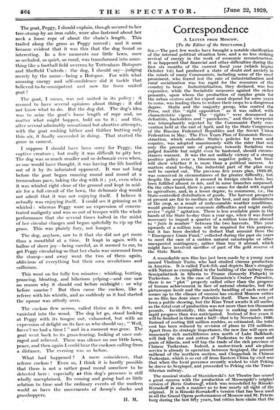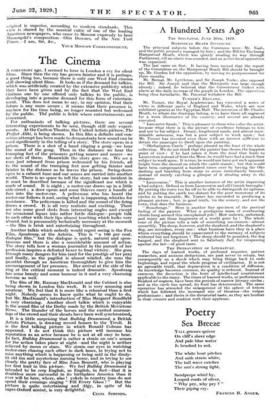Correspondence
A LETTER FROM MOSCOW. [To the Editor of the Srzerwroa.] Sin,—The past few weeks have brought a notable clarification of the internal political situation here, and a no less striking revival of energy in the work of economic reconstruction. It so happened that financial and other difficulties during thg first six months of the current fiscal year (which begins October 1st) had produced a state of doubt and anxiety hi the minds of many. Communists, including some of the most prominent, who feared lest the rate of industrialization and rural socialization was too rapid for the resources of the country to bear. Industrialization, they declared, was too expensive, while the Socialistic measures against the richer peasants, upon whom the production of surplus grain for the urban centres and for export must depend for some years to come, was leading them to reduce their crops to a -dangerous degree. Stalin and the majority group, who control the Press, met this " right opposition ' as it was called, with characteristic vigour. The " rights " were denounced as defeatists, backsliders and " panickeers," and their viewpoint was triumphantly rejected by the Communist Party con- vention held at the end of April, and by the State Congresses of the Russian Federated Republics and the Soviet Union Federation in May. The Five Years Plan of Economic Recon- struction, which embodies Stalin's policies for town and country, was adopted unanimously with the rider that not only the present rate of progress towards Socialism was judged feasible but might even be hastened, should circum- stances warrant. It was the not unlikely victory of a strong positive policy over a timorous negative policy, but time will show whether it is more than a political success. As matters stand to-day, the industrial part of the plan may well be carried out. The previous five years plan, 1928-28, was conceived in circumstances of far greater difficulty, but despite the scepticism it aroused in foreign circles here, has been fulfilled almost in toto, and in some branches surpassed. On the other hand, there is grave cause for doubt with regard to agriculture, and, in a lesser degree, to commerce, i.e., the State-controlled distribution of goods. The harvest prospects at present are fair to medium at the best, and any diminution of the crop, as a result of unfavourable weather conditions, would greatly increase economic difficulties and might easily revive right " agitation. There is less available grain in the hands of the State to-day than a year ago, when it was found necessary to import a quarter of a million tons from abroad to " faire la soudure" between the two harvests. This year upwards of a million tons will be required for this purpose, but it has been decided to deduct that amount from the " Emergency Grain Fund," collected during the past six years to meet the case of a sudden natural catastrophe or other unexpected contingency, rather than buy it abroad, which might have involved sacrifice of part of the gold reserve of the State Bank.
A remarkable new film has just been made by a -young man named Vladimir Turin, who had studied cinema produCtion in America. It is called Turk-Sib, and depicts Man's struggle with Nature as exemplified in the building of the railway 'from Semipaliatinsk in Siberia to Frunze (formerly Pishpek) in Turkestan. As in the case of Eisenstein's Cruiser Potemkin, there is no " plot " properly called other than the progress of human achievement in face of natural obstacles, but the picturesque locale and the masterly handling of each series of scenes up to the climax of success has excited Moscow critics as no film has done since Potemkin itself. There has not yet been a public showing, but the Kino Trust awaits it all smiles; as the total cost of production was not more than ten thousand pounds. Incidentally, this railway is making much more rapid progress than was anticipated. Instead of five years it will be finished in three and a half—that is by November, 1.980. Instead of costing 225 million roubles, as estimated, the total cost has been reduced by revision of plans to 175 millions. Apart from its strategic importance, the new line will open an immensely rich metalliferous area north of Lake Balkhash; will link the rice and cotton of Turkestan to the meat and grain of Siberia, and will tap the trade of the rich province of Chinese Turkestan. Indeed, a motor-truck and' air-plane service is already in operation between Sergiopol, the present railhead of the northern section, and Chugachak in Chinese Turkestan, which is so cut off from Eastern China by civil war that when the local governor recently wished to visit Peking he drove to Sergiopol, and proceeded to Peking via the Trans- Siberian railway.
The musical studio of Stanislawski's Art Theatre has scored a great success with theproduction of Mussorgski's original version of Boris Godounoff, which was remodelled by Rimski- Korsakoff in such a manner as to lose nearly all sight of the original. It is Rimski-Korsakoff's version that has beeri used in all the Grand Opera performance's of Moscow- and St. Peters=, burg during the last fifty years, but critics here claim that the
original is superior, according to modern standards. This view is shared by the musical critic of One of the leading American newspapers, who came to Moscow expressly to hear Mussorgski's composition—Olin Downes, of the New York Times.—I am, Sir, are., YOCR MOSCOW CORRESPONDENT.













































 Previous page
Previous page